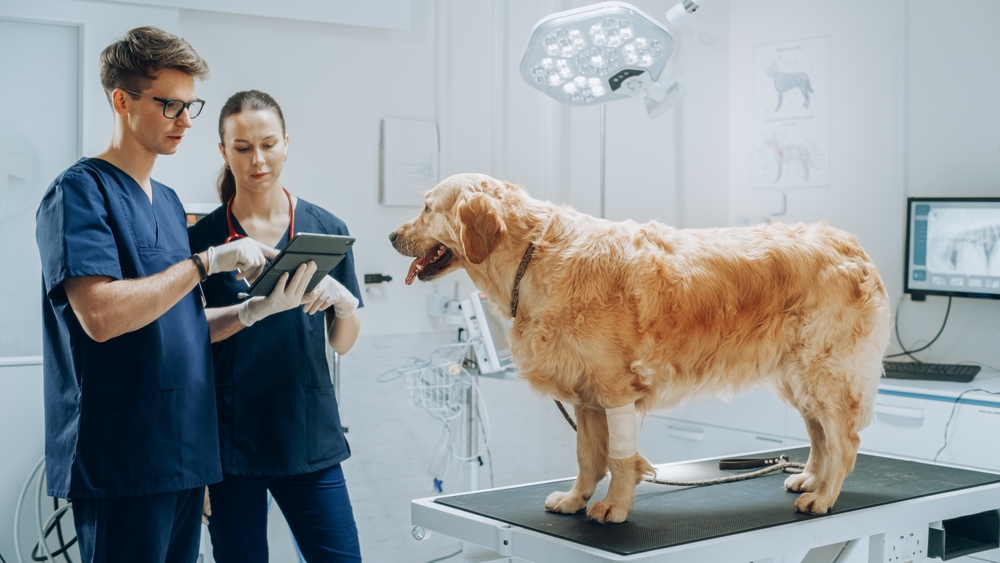You may think you know everything about your pet, but you can always learn more about your furry friends’ health. Genetic screening is a powerful tool that provides deep insights into your pet’s genetic makeup, health risks, and unique traits. Our team at North Waterloo Veterinary Hospital explains how this valuable information can improve your pet’s care and lifelong health.
Detect your pet’s health issues early
Genetic screening’s most significant benefit is the ability to detect potential health issues long before they manifest clinically. Certain breeds are prone to specific genetic diseases, such as hip dysplasia or heart conditions, and genetic screening can identify these predispositions early, allowing for proactive management and preventive measures. For example, by identifying your pet’s genetic predisposition to hip dysplasia, you and our team can implement preventive measures early, potentially slowing the disease’s progression and improving your furry pal’s quality of life.
Make informed pet breeding decisions
Ethical breeding practices prioritize pets’ health and longevity, and genetic screening plays a vital role in achieving these goals. By screening for genetic diseases and hereditary conditions, breeders can make informed decisions to minimize the risk of passing on undesirable traits to offspring. Selecting mates based on their genetic compatibility and health status contributes to a breed’s overall health and vitality.
Develop a personalized treatment plan for your pet
Every pet is unique, and their response to medications and treatments varies. Genetic screening provides insights into your pet’s genetic makeup, which can influence how they metabolize certain drugs or respond to specific therapies. By knowing your pet’s genetic profile, our veterinarian can tailor their treatment to prevent potential adverse reactions and ensure optimal efficacy.
Learn about your pet’s breed composition and ancestry
Genetic screening can accurately identify the breeds present in a mixed-breed pet’s ancestry, which is particularly helpful if their physical appearance doesn’t clearly indicate their breed heritage. This information satisfies pet owners’ curiosity and provides insight into a pet’s genetic background, behavioral tendencies, and potential health risks.
Save money on veterinary care
Through your pet’s genetic screening results, our team knows which diseases your pet could potentially develop, helping us safeguard their health. Genetic screening can also provide you with the following long-term financial benefits:
- Preventive health care savings — By identifying your furry pal’s potential health issues before they develop or escalate, you can take proactive measures to manage or mitigate these conditions. This proactive approach often translates into fewer veterinary visits and lower overall healthcare costs in the long run.
- Avoiding costly treatments — Certain hereditary diseases and conditions can be expensive to treat, especially if they progress to advanced stages. By identifying your pet’s genetic predispositions early through screening, you can take measures to prevent or minimize your furry pal’s risks of these conditions developing or progressing. Doing so helps you prevent your pet’s need for expensive surgeries, medications, and specialized treatments, saving a significant amount on veterinary expenses.
- Breed-specific health management — Each breed has a predisposition to specific health conditions. Genetic screening can reveal breed-specific health risks and guide you in managing these risks effectively. For example, if a genetic screening indicates that your pet’s particular breed is prone to joint issues, such as hip dysplasia, you can invest in preventive measures, such as orthopedic supplements or specialized diets, to support your furry pal’s joint health and potentially reduce the need for costly treatments as they mature.
Gain insight into your pet’s weight

Certain genetic factors can predispose pets to being underweight, overweight, or obese. Specific gene variants may affect a pet’s metabolism, appetite regulation, or fat storage. Genetic screening can identify these genetic markers and provide insights into their potential impact on your pet’s weight. This information can also inform personalized nutritional recommendations based on your pet’s genetic makeup. For example, if your pet carries genetic markers associated with a slow metabolism or a high obesity risk, our veterinarian can recommend dietary adjustments to help manage your furry pal’s weight. By tailoring your pet’s diet to their genetic profile, our team can optimize your furry pal’s nutrition, supporting their healthy weight.
With the information that genetic screening provides, you can make informed decisions about your pet’s health and lifestyle. To learn more information about pets’ genetic testing, contact our team at North Waterloo Veterinary Hospital.







Leave A Comment